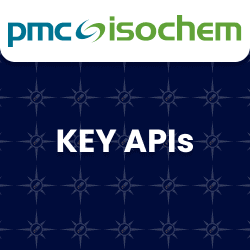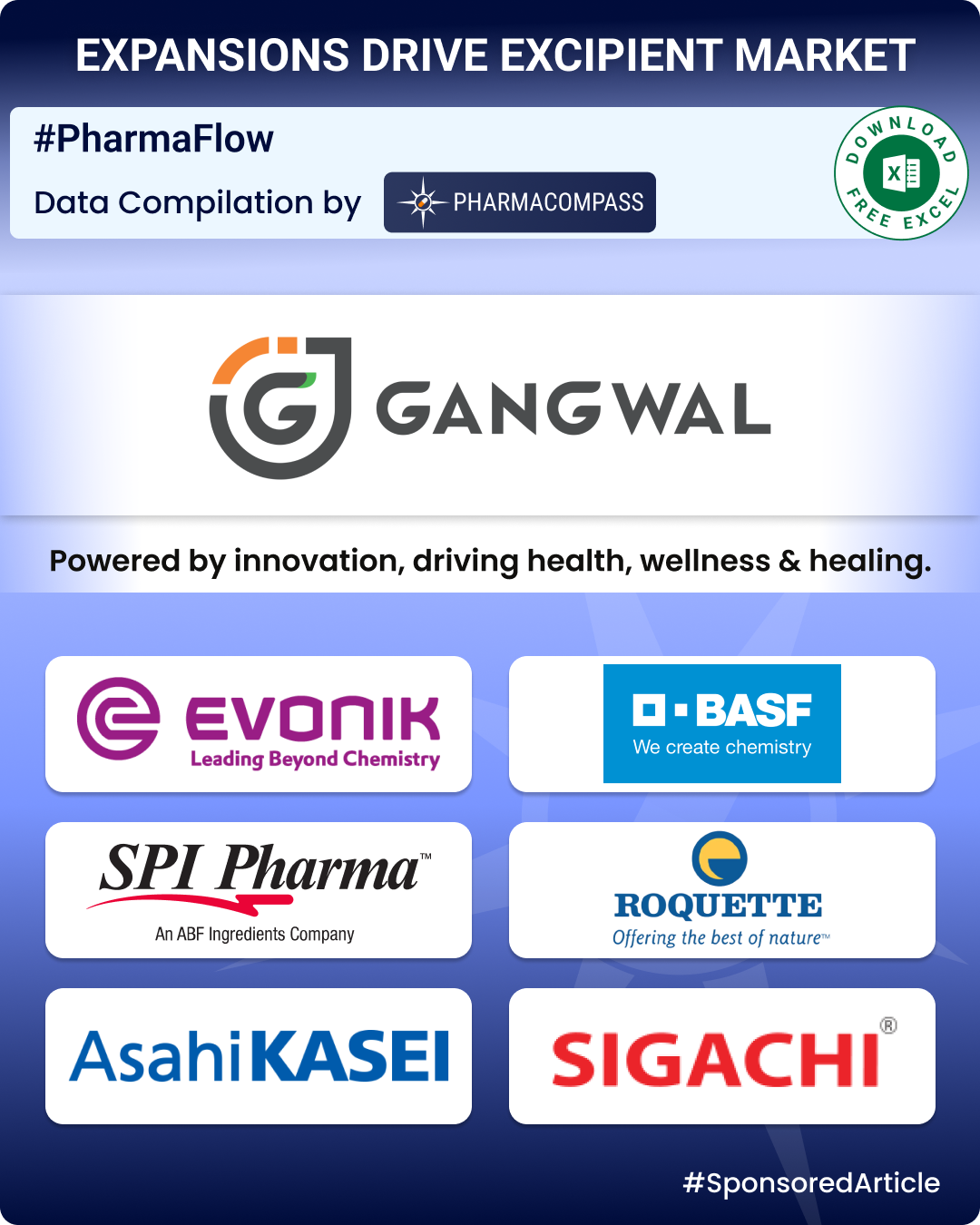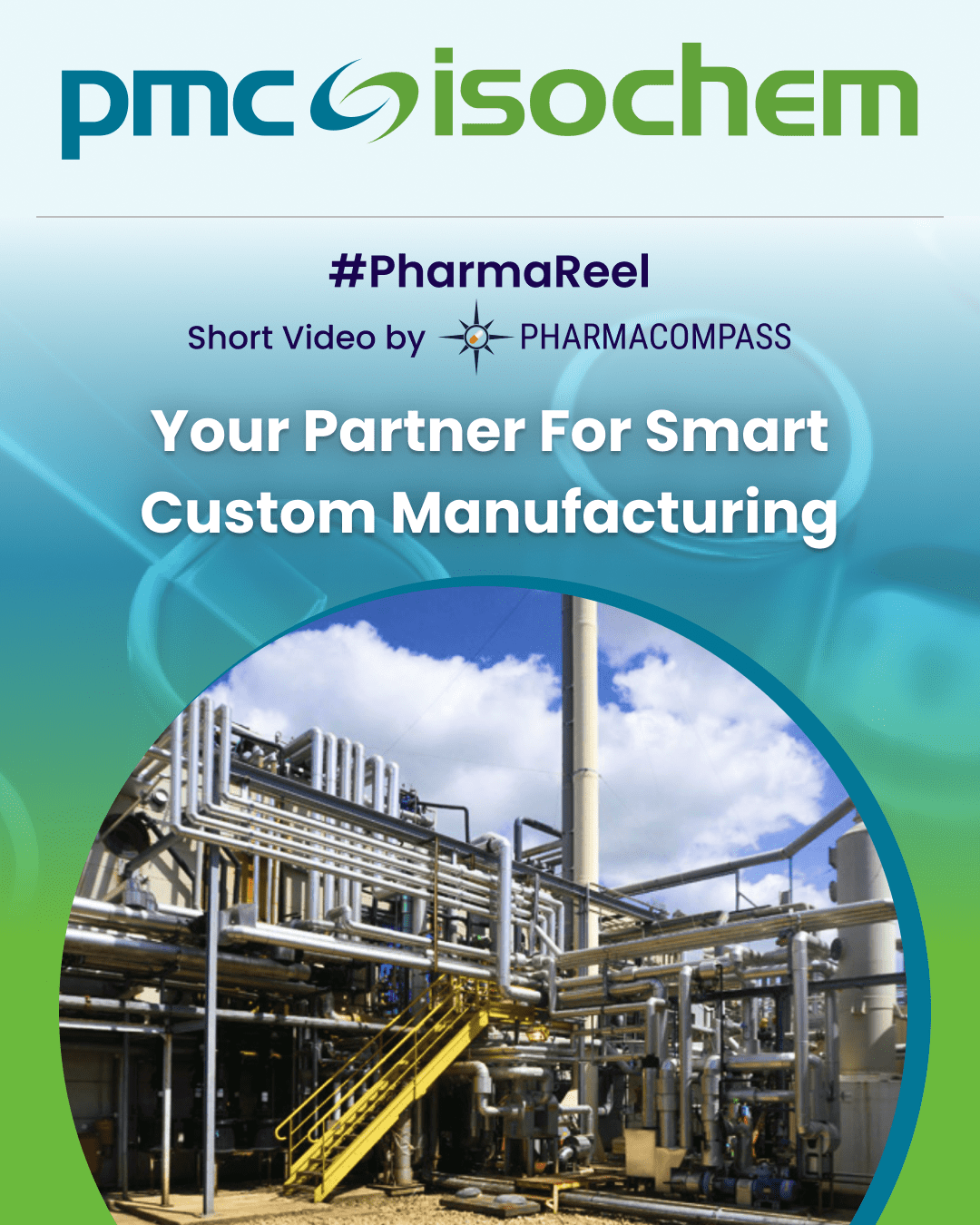06 May 2024
// PHARMAEXCIPIENTS
01 Dec 2023
// PRESS RELEASE
07 Sep 2022
// PHARMAEXCIPIENTS
 KEY PRODUCTS
KEY PRODUCTS KEY EXCIPIENTS
KEY EXCIPIENTS
PMC Isochem is your partner for smart CDMOs of Intermediates, APIs, & excipients & a catalog of Intermediates & Generic APIs.
About
Industry Trade Show
Not Confirmed
24-26 February, 2026
Industry Trade Show
Not Confirmed
27-29 January, 2026
Industry Trade Show
Not Confirmed
27-28 January, 2026
CONTACT DETAILS






Other e-mail IDs
Global Portfolio: dmo@pmcisochem.fr
Intermediates: intermediates@pmcisochem.fr
Vitamin E TPGS, PAA Polymers & NCAs-UNCAs: k.salim@pmcisochem.fr
Events
Webinars & Exhibitions
Industry Trade Show
Not Confirmed
24-26 February, 2026
Industry Trade Show
Not Confirmed
27-29 January, 2026
Industry Trade Show
Not Confirmed
27-28 January, 2026
VLOG #PharmaReel
CORPORATE CONTENT #SupplierSpotlight
https://www.pharmacompass.com/radio-compass-blog/excipient-market-overview-evonik-launches-high-purity-excipients-india-mandates-disclosures-from-march-2026
https://www.pharmacompass.com/radio-compass-blog/excipient-market-overview-roquette-announces-restructuring-post-iff-pharma-buyout-who-fda-advance-regulatory-frameworks
https://www.pharmacompass.com/radio-compass-blog/chinese-fda-registered-generic-facilities-gain-steam-india-maintains-lead-with-396-facilities
https://www.pharmacompass.com/radio-compass-blog/excipient-market-overview-roquette-seqens-evonik-make-strategic-moves-new-guidelines-deal-with-contamination

06 May 2024
// PHARMAEXCIPIENTS

01 Dec 2023
// PRESS RELEASE

07 Sep 2022
// PHARMAEXCIPIENTS

22 Feb 2021
// PRESS RELEASE
https://pmcisochem.fr/article/pmc-group-international-announces-acquisition-copperhead-chemical-company

16 Dec 2020
// PRESS RELEASE
https://pmcisochem.fr/article/pmc-isochem-accelerate-polyamino-acids-business-part-isodel%C2%AE-drug-delivery-offer-unique-one

15 Dec 2020
// PRESS RELEASE
https://pmcisochem.fr/article/pmc-isochem-accelerate-polyamino-acids-business-part-isodel%C2%AE-drug-delivery-offer-unique-one
GDUFA
DMF Review : N/A
Rev. Date :
Pay. Date :
DMF Number : 6170
Submission : 1985-01-24
Status : Active
Type : II
GDUFA
DMF Review : Complete
Rev. Date : 2013-02-26
Pay. Date : 2013-02-13
DMF Number : 7617
Submission : 1988-08-02
Status : Active
Type : II
GDUFA
DMF Review : N/A
Rev. Date :
Pay. Date :
DMF Number : 12175
Submission : 1996-10-08
Status : Active
Type : II
GDUFA
DMF Review : Complete
Rev. Date : 2016-10-07
Pay. Date : 2016-04-26
DMF Number : 26872
Submission : 2013-01-31
Status : Active
Type : II
GDUFA
DMF Review : N/A
Rev. Date :
Pay. Date :
DMF Number : 5560
Submission : 1984-10-10
Status : Active
Type : II
GDUFA
DMF Review : N/A
Rev. Date :
Pay. Date :
DMF Number : 21834
Submission : 2008-07-29
Status : Active
Type : II
GDUFA
DMF Review : N/A
Rev. Date :
Pay. Date :
DMF Number : 15886
Submission : 2002-02-28
Status : Active
Type : II
GDUFA
DMF Review : N/A
Rev. Date :
Pay. Date :
DMF Number : 11682
Submission : 1995-09-19
Status : Active
Type : II
GDUFA
DMF Review : N/A
Rev. Date :
Pay. Date :
DMF Number : 19765
Submission : 2006-09-12
Status : Active
Type : II
GDUFA
DMF Review : N/A
Rev. Date :
Pay. Date :
DMF Number : 23823
Submission : 2010-05-20
Status : Active
Type : II
 FULL SCREEN VIEW Click here to open all results in a new tab [this preview display 10 results]
FULL SCREEN VIEW Click here to open all results in a new tab [this preview display 10 results]Services
API Manufacturing
Drug Product Manufacturing
Analytical
API & Drug Product Development
Excipients
Excipients by Ingredients
Excipients By applications
ABOUT THIS PAGE
PMC Isochem is a supplier offers 27 products (APIs, Excipients or Intermediates).
Find a price of Amiodarone Hydrochloride bulk with DMF, JDMF offered by PMC Isochem
Find a price of Econazole Nitrate bulk with DMF, CEP offered by PMC Isochem
Find a price of Pantoprazole Sodium bulk with DMF, CEP offered by PMC Isochem
Find a price of Trimebutine Maleate bulk with DMF, CEP offered by PMC Isochem
Find a price of 4A-Tert-Butyl-4-Chlorobutyrophenone bulk with DMF offered by PMC Isochem
Find a price of Acetohydroxamic Acid bulk with DMF offered by PMC Isochem
Find a price of Domiphen Bromide bulk with DMF offered by PMC Isochem
Find a price of Econazole Nitrate bulk with CEP offered by PMC Isochem
Find a price of Indoramin Hydrochloride bulk with DMF offered by PMC Isochem
Find a price of Nefopam Hydrochloride bulk with DMF offered by PMC Isochem
Find a price of Vitamin E TPGS API bulk with DMF offered by PMC Isochem
Find a price of 1,3,5-Trimethoxybenzene bulk offered by PMC Isochem
Find a price of Alminoprofen bulk offered by PMC Isochem
Find a price of Dasabuvir Sodium bulk offered by PMC Isochem
Find a price of Elbasvir bulk offered by PMC Isochem
Find a price of Enilconazole bulk offered by PMC Isochem
Find a price of Fenticonazole Nitrate bulk offered by PMC Isochem
Find a price of Glecaprevir bulk offered by PMC Isochem
Find a price of Grazoprevir bulk offered by PMC Isochem
Find a price of Loperamide Hydrochloride bulk offered by PMC Isochem
Find a price of Naftazone bulk offered by PMC Isochem
Find a price of Ombitasvir bulk offered by PMC Isochem
Find a price of Paritaprevir bulk offered by PMC Isochem
Find a price of Pibrentasvir bulk offered by PMC Isochem
Find a price of Pipazethate Hydrochloride bulk offered by PMC Isochem
Find a price of Ritonavir bulk offered by PMC Isochem
Find a price of Ubrogepant bulk offered by PMC Isochem


 PMC Isochem
PMC Isochem




